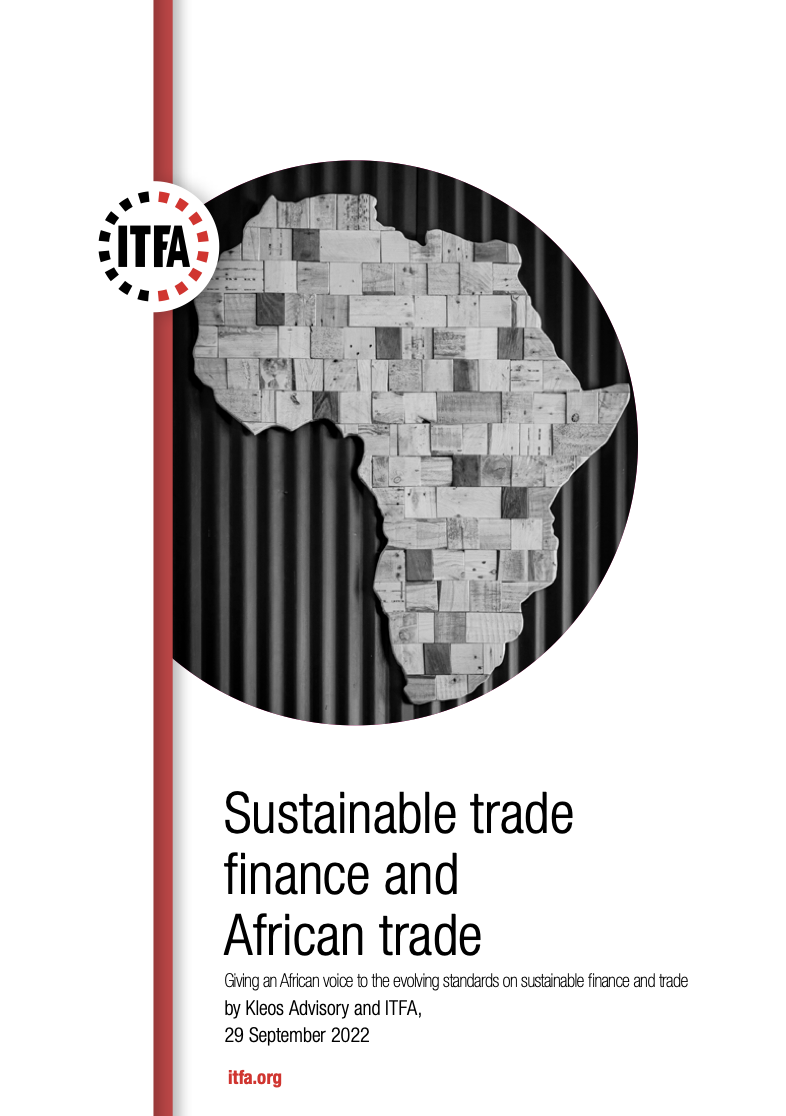White Paper on sustainability, trade finance and African trade by Kleos Advisory and the International Trade & Forfaiting Association (ITFA), 29 September 2022
Africa’s trade finance gap, estimated to be between USD 80bn to USD 120bn, has widened further over the past decade, exacerbated by the disruption to global supply chains caused by the Covid-19 pandemic. The lack of access to trade finance especially impacts Africa’s SMEs, which make up around 80% of African traders, and whose banks struggle with regulatory costs to profitably finance their merchant activities. Against this background, growing ESG requirements (mainly related to climate impact) have added a further challenge for African traders.
The Sustainable Development Goals (SDGs) and the Paris Climate Agreement have been broadly adopted as benchmarks by all businesses, sectors and governments, shaping the ESG standards and regulations that are emerging. But to date the focus has been on climate action and decarbonisation of the economy. Given that Africa accounts for just 3% of world Greenhouse Gas (GHG) emissions (versus 25% for the G7 countries), this focus is misaligned with the sustainability objectives of Africa, which embrace broader environmental and social impacts, such as deforestation and the treatment of workers in the supply chain. The climate-centric approach also fails to recognise the positive role played by trade in the economy. According to World Bank data, trade makes up 50% of Africa’s real GDP and employs around 80% of the population. This makes trade finance hugely impactful in terms of boosting economic growth and opportunities. In addition, African trade is directly linked to nearly all of the SDGs, notably poverty reduction, economic growth and gender inclusion.
Given the current focus of the global sustainability agenda, there is a risk that the standards being developed for sustainable trade finance could prove unworkable for African trade. These standards have been designed for multinational manufacturers and merchants in developed markets, rather than SMEs in emerging markets, and African traders will struggle to meet the data and reporting requirements being proposed. ESG is not just about decarbonisation, it is also about the need for a ‘just transition’, which recognises that “one size does not fit all” and which compensates for the wider social impacts of moving to a more sustainable economic model. This is especially the case in Africa, where the population is among the most vulnerable in the world to the impacts of climate change, and where most Africans work in industries that are now excluded from trade finance.
This is why we need to reframe the argument around African trade finance, recognising that African trade’s high exposure to sustainability risks and impacts is an opportunity to unlock financing for African traders. Banks, regulators, international DFIs and investors need to recognise that trade finance is remarkably low risk and comes with a high level of governance embedded in its structure. This includes mediating bank regulation, detailed credit analysis, setting KYC and documentation requirements and implementing robust monitoring processes. African trade finance is therefore the perfect tool for achieving the SDGs, as trade is linked to all parts of the economy and the supply chain. This gets to the core of the UNEP-FI’s Principles for Responsible Banking (PRB), which call on financial institutions to embrace the concept of ‘double materiality’, assessing both their financial and ESG impacts and doing everything in their power to minimise the negative impacts and maximise the positive ones.
African banks will need to play a leading role in this process, providing the essential bridge between international liquidity providers and African SME traders. Working together, African banks can break the logjam, aggregating revolving trade portfolios which can then be financed by international banks, DFIs and investors. But if African banks are to play this role, international lenders need to put more trust in them, especially in their ability to judge the sustainability impacts of their lending. The key to unlocking this opportunity is building capacity in African banks, and this is where regulators and governments can provide support, training staff on the ESG / sustainability impacts of trade, helping them to develop meaningful metrics to measure their performance and reap the full benefits of digitalisation. There is also a large opportunity to develop a new generation of sustainable trade finance products.
Given the potential negative impacts that emerging Western-focused ESG standards could have on African trade, and the huge potential of African trade finance to deliver on the SDGs, African banks and institutions must make their voices heard.
This White Paper proposes five priorities for action:
Click here to read the full White Paper.
